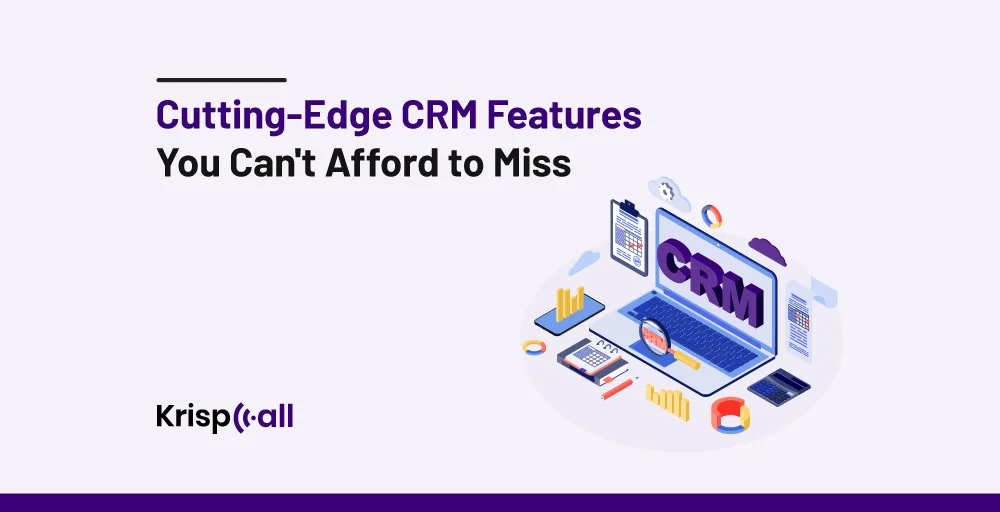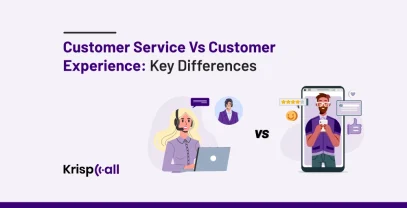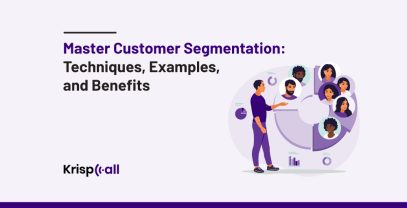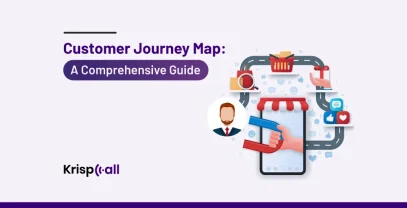As your customer base increases, you face difficulties 😒 managing large data, providing better customer support, and handling cumbersome documents 📃. When all those problems arise, you might think, should I shift my project management software to a better one?
With advanced CRM features, you can organize all those huge, cumbersome documents, manage all customers’ behaviors and interactions, and provide satisfaction customer support with sophisticated call-handling 📞 features.
This blog will cover the basics of CRM, its benefits, what types of businesses should use CRM software, and the advanced features that you didn’t know you needed.
🔑 KEY HIGHLIGHTS
- CRM is a software tool that businesses use to manage and analyze customer interaction.
- With CRM features, businesses of any size and type can increase their customer base and drive sustainable growth.
- CRM offers advanced features such as contact management, workflow and approvals, chat integration, reports and dashboards, analytics integration, and customer service automation.
What Is CRM?
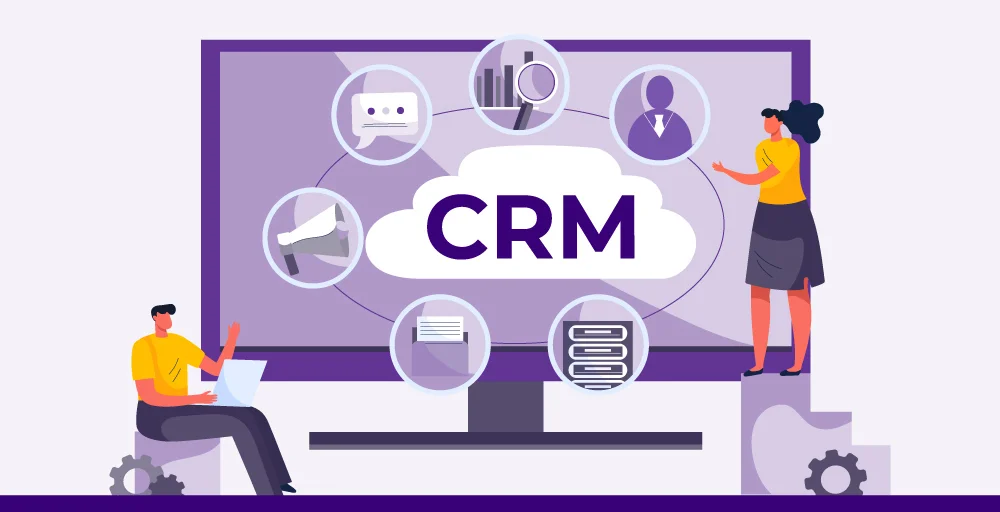
CRM stands for Customer Relationship Management, a software tool that allows businesses to manage and analyze customer interaction. It is both a strategy and a set of software tools businesses use to manage interaction with current and potential customers.
CRM systems improve relationships to grow a business. They help organizations streamline processes, improve customer satisfaction, and automate marketing. They also help improve sales and customer service experience, centralize customer data, and enhance customer relationships to increase profitability.
It offers various features for customer ease and business growth, such as lead management, easy email integration, contact management, sales pipeline management, and many more. Businesses can use those features to increase their customer base and sustainably drive growth.
Who Uses CRM Software?
CRM software can be beneficial to businesses of all sizes and types. For large enterprise-level companies, it can be beneficial as they provide a central database to track customer activity and share it among different departments. Small businesses or startups that often need to do more with less can get super benefits from CRM software.
CRM management software can enhance productivity for the IT department, sales and marketing teams, customer services teams, and other departments. It provides a user-friendly interface and is easy to use.
Top 20 CRM Features To Look For
Now that you know what a CRM software is. Now take note – CRM tools provide various features; some are unique to certain brands, while others features are generic.
The Top 20 CRM advanced features to look for are listed below:
1. Report and Dashboard
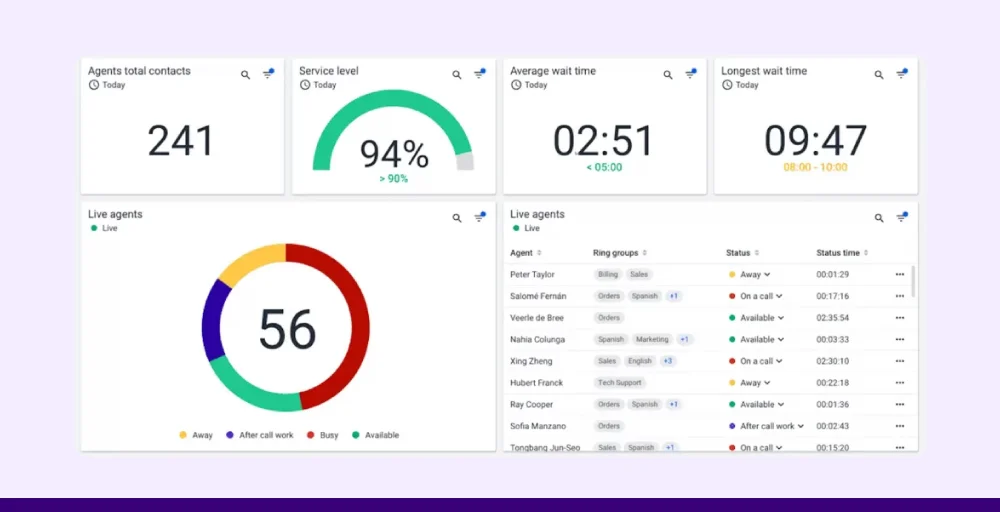
These tools provide valuable insights into business through their reports and dashboard features. Reports offer deep-dive information on specific areas, like customer interaction, sales performance, and marketing effectiveness.
On the other hand, dashboards provide real-time snapshots, such as key sales metrics, through infographics like graphs and charts. Both these features help monitor sales performance and goal achievement and gain insights into customer interaction. Having access to this information ensures businesses make better decisions and stronger customer connections.
2. Contact Management
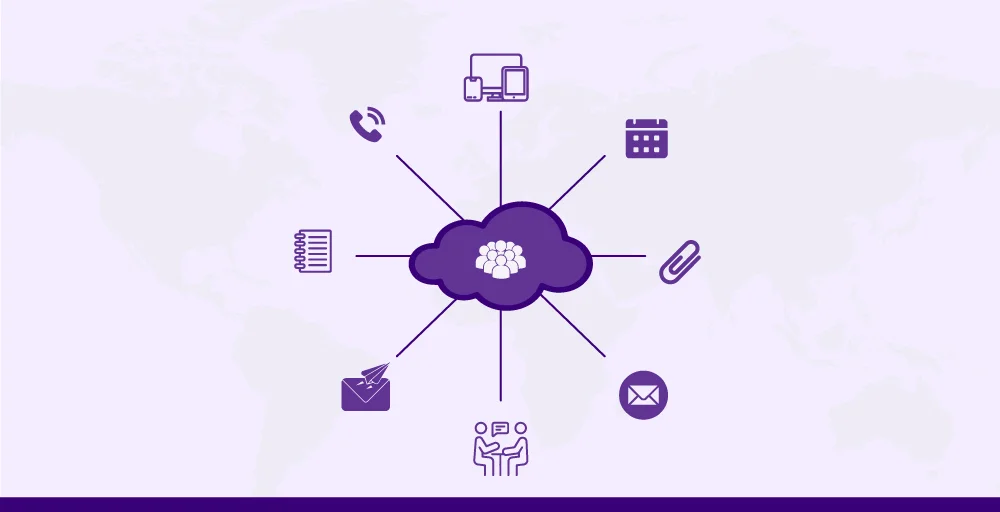
Contact management, also sometimes called customer management software, is one of the important features of CRM as it allows the customer to organize and group their contact for easy access in the future. It is the customer’s digital address book. Keeps all your customer information organized and can be accessed easily.
3. Lead Management
Tracking the lead score is essential for businesses. With CRM lead score, you can improve your sales efficiency and productivity. CRM software allows for tracking the customer’s behavior and details based on geographical and psychographical factors. With this feature, businesses can track who the leads are, how close they are to becoming our new customers, where they came from, and their chances of becoming potential customers.
4. Sales Team and Customer Opportunity Management
With sales and customer opportunity management features, you can track the progress of potential sales and closed deals. Using Sales pipelines, you can visualize the potential sales progress stages from “Lead” to “Deal closed.” It also offers various features such as lead scoring, task management, and sales forecasting.
It monitors all details of the potential sales, including their contact information, product interest, and estimated value. It inspects data on sales performance to identify weaknesses, strengths, and potential areas for improvement.
5. Sales Analytics

It can improve sales pipelines. Sales analytics is one of CRM’s most powerful features. With these features, businesses can analyze past customer data to improve future sales. Data can be collected from various sources, such as websites, social media, and polls.
6. Mobile CRM
There are more smartphone users these days. Accessing content from mobile is easier than accessing content from other devices. With Mobile CRM, you can access customer information, manage sales pipelines, update information in real-time, and boost productivity through mobile devices.
7. Email Client Integration
CRM provides easy email integration within the software. With this feature, you can centralize all your emails in one place and communicate with customers through email using CRM software. It eliminates the need to switch platforms for integration service.
8. Workflow and Approvals
Automation workflow not only eliminates time but also helps to maintain efficiency in the business. CRM software can facilitate optimization through the automation process, such as data collection and analysis, as well as sales and marketing campaigns. It replaces the manual task with automation.
9. CRM Data/File Storage
CRM safeguards your data by protecting and providing a backup of all your sales-related activities to prevent losses and security breaches. It stores your data in an organized way, so acquiring data whenever needed can be done efficiently. CRM manages and stores all your sales-related files, like quotes and proposals.
10. Sales Data
CRM has the ability to organize your sales and customer data into manageable chunks. CRM collects your sales data to track all sales activities, such as purchase sales history, sales process, and sales team performance.
CRM analyzes the collected data and provides actionable insights. It identifies trends and patterns, forecasts future sales, optimizes marketing campaigns, improves sales training, pinpoints areas, and makes data-driven decisions.
11. File Sync and Share
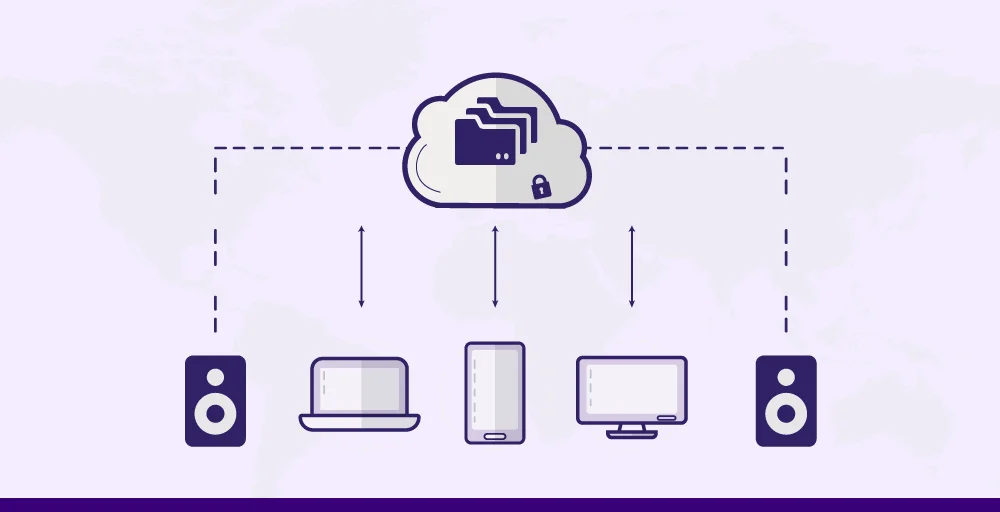
With the CRM synchronization function, you can upload emails from Outlook, import spreadsheets, sync your files with Google Drive, and use many more file sync features. It provides a platform for sharing features, eliminating switching problems between apps.
12. Chat Integration
CRM chat features allow you to chat with partners, employees, and colleagues. With CRM chat integration, you can directly provide customer support to your system. Chat features are priceless; you can embed a live chat feature in your applications.
13. Web Analytics Integration
The integration of web analytics helps analyze your raw data, such as website traffic and visitors, identify problem areas, and suggest ways to improve. It provides insights into how your user base interacts with your software. It offers an easy interface to collect and access these statistics.
14. Support Automation
Rather than relying on manual support, customer support is done through automation. Customer support features like FAQ pages, chatbots, and email support can be executed automatically in a good CRM. Customers can get basic support independently.
15. Third-party Integration
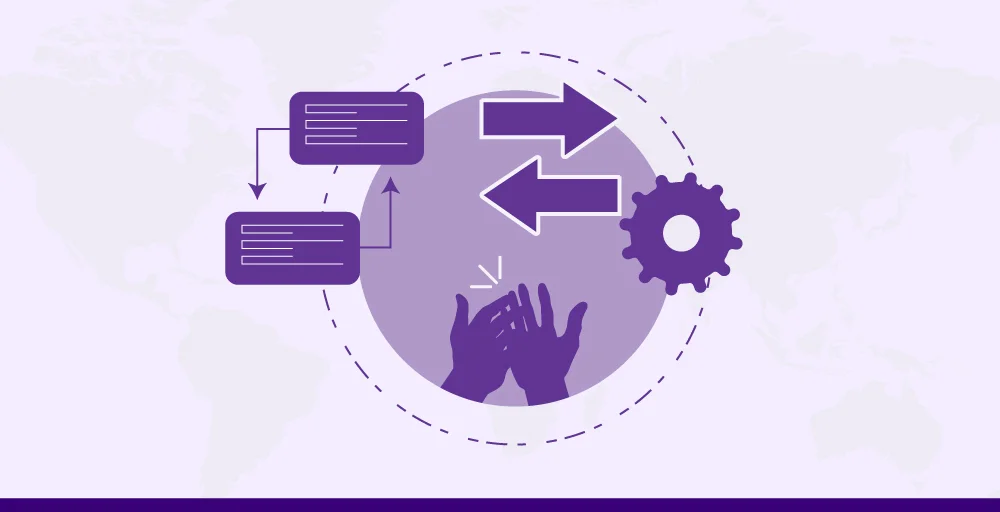
CRM software can be integrated with third-party software. It offers various software tools that can be integrated with CRM to provide more functionality and streamline processes. The integration process is not tedious as it handles all the complex tasks and eliminates the app switching problems.
16. Customization Options
Using CRM software is flexible as it provides more customizable options. The customizable function of CRM helps you adapt and integrate it with your existing software. It can be changed according to your needs and requirements. More customization and flexibility help to boost your productivity.
17. Project Management
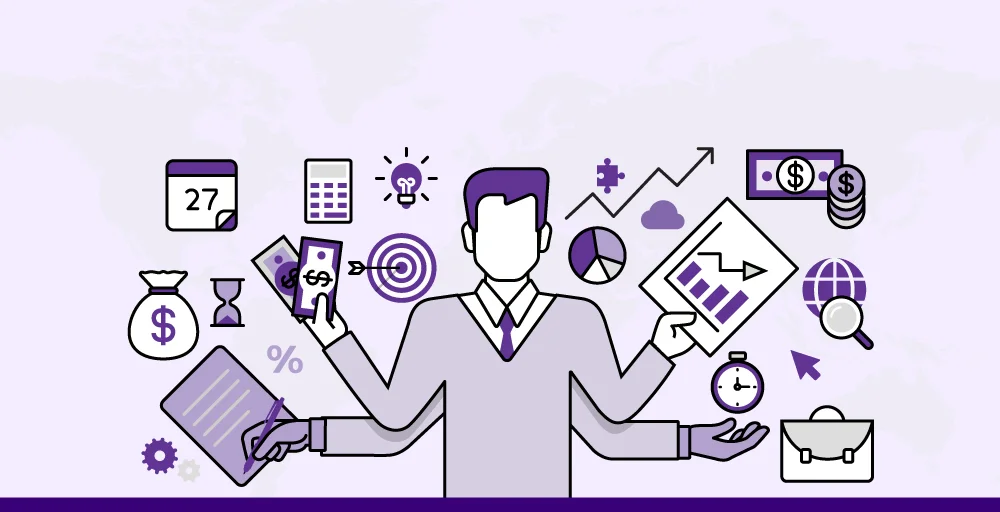
Missing deadlines and meetings can be forgotten daily as your company has many messy spreadsheets. With CRM software, you can organize all those spreadsheets and avoid missing meetings. It provides built-in management tools for your project to make client scheduling meetings with ease.
CRMs with project management features can simplify meeting scheduling by allowing you to view team availability and assign tasks. Meetings can be directly linked to project timelines, and everyone can keep all project communications and notes in one place, ensuring everyone stays on the same page.
18. Tracking
It helps you track your customers’ behavior and interactions. With this CRM feature, you can track their behavior journeys from the initial phase of contact for buying a product to after-sales interaction. Tracking features also provide business-specific metrics such as win rate, lead score, and customer lifetime value.
19. Customer Service Automation
With CRM software, users can manage each case individually for a better customer experience.
It improves customer satisfaction levels, tracks their behavior and interaction, and closes and re-opens existing customer cases. It provides an automation service to personalize client communication.
20. Documents Management
With its advanced search capabilities, CRM organizes all your cumbersome documents, making them easy to access and retrieve. With CRM software, you can easily convert offline documents into online ones and share them through chat or email with your accounts, contacts, leads, and deals for better access.
Conclusion
CRM offers advanced features for your business growth and customer ease. With CRM features, businesses of any size can increase their customer base and drive sustainable growth.
CRM advanced features such as contact management, data analytics, reporting, and customer support ticketing help to enhance the IT department, sales and marketing, and other department teams.
KrispCall is one of the best cloud telephony software packages that integrates well with many CRM software packages in the market and offers advanced CRM capabilities for your business. It provides advanced call-handling features such as IVR, inbound and outbound VoIP calls, auto dialer software, automatic call distribution, call analytics, and more.

